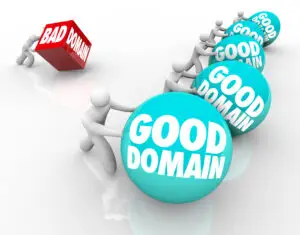Stop! Buying a Domain Name Without These 3 Critical Tips Could Cost You
Before you rush off to snag that perfect-sounding domain name, slow down for a moment.
It’s easy to get caught up in the excitement of launching a new brand, business, or idea—but choosing a domain name is a critical decision that can impact everything from your search engine rankings to your customer’s ability to find and trust you.
So before you click “Buy Now,” make sure you know these three essentials:
1. How Buying a Domain Name Impacts Your SEO
Search engines care about your domain name—and so do your customers.
Your domain name is one of the first signals search engines receive about what your site is all about. While Google’s algorithm has evolved past giving huge weight to exact-match domains, relevant keywords in your domain can still make a difference—especially when paired with solid content and a good reputation.
Want to go deeper? Check out our SEO essentials for web design for tips on how your domain name fits into the bigger picture.
Here’s what to consider:
Relevance matters. A domain that clearly matches your brand or industry helps users (and search engines) instantly understand what you’re offering.
Avoid keyword stuffing. Something like
best-cheap-widgets-online.netlooks spammy and will hurt more than it helps.Short and simple wins. Clean, clear domains are easier to remember and less likely to be mistyped.
Bonus tip: A fresh domain (one that’s never been owned before) is a blank slate. But if you’re buying a previously owned domain, do your research—check for blacklisting, spammy backlinks, or penalties in its history. A cheap domain isn’t worth it if it comes with baggage. Use tools like Wayback Machine to browse the site’s history and see what kind of content was previously hosted there, and MX Toolbox to scan for blacklist issues or email deliverability problems. Just enter the domain name to get a snapshot of its past.
2. If It’s Hard to Say or Spell, You’re Losing Traffic
It might sound obvious, but it’s a trap people fall into all the time: choosing a name that looks cool but no one can pronounce, spell, or remember.
If someone hears your domain in a podcast or conversation, can they type it in later without asking you to repeat it? If they get it wrong the first time, are they landing on someone else’s site—or worse, a domain that doesn’t even load?
Here’s how to protect yourself:
Stick with common spellings unless you’re a household brand that can afford to educate your audience.
Avoid hyphens and numbers—they make your domain sound awkward and are often mistyped.
Buy common misspellings of your domain, especially if it’s even slightly ambiguous. You can redirect them all to your main site and never worry about lost traffic again.
Example: Let’s say your brand is “Fynix Solutions.” Unique? Sure. But you’ll need to grab finixsolutions.com, phoenixsolutions.com, and maybe even finicksolutions.com—because your customers will type those in first.
It’s not just about branding—it’s about protecting your business and making it easy for people to find you.

3. SSL and Domain Renewals Aren’t Optional
A domain name isn’t a one-time purchase. It’s an ongoing responsibility—and the technical pieces behind it can’t be ignored.
🔐 SSL: Why It Matters
SSL (Secure Sockets Layer) is what encrypts the connection between your website and its visitors. When you have SSL set up properly, your domain starts with https:// and displays that reassuring little padlock in the browser.
Why it’s critical:
Trust: Users are much more likely to bounce if they see “Not Secure” warnings in their browser.
SEO: Google has confirmed that HTTPS is a ranking signal. No SSL? Lower rankings.
Compliance: If you handle any user data—like emails or contact forms—SSL is a must-have to meet privacy expectations (and often, legal requirements).
Most hosting providers offer free SSL certificates now through services like Let’s Encrypt, but they still need to be installed and renewed regularly. Some providers handle that for you—others expect you to manage it yourself.
🕒 Domain Renewal: Don't Lose What You’ve Built
Every year, countless businesses lose their domain names because someone forgot to renew them. Once a domain expires, there’s usually a short grace period—but after that, it goes back into the wild. If someone else grabs it, you might have to buy it back at a premium—or worse, rebrand entirely.
If you’re buying a domain name today, don’t stop there—make sure you’re protecting your investment long term.
How to avoid disaster:
Enable auto-renew with your registrar.
Set calendar reminders before the renewal date, just in case.
Use a permanent email address (not tied to a specific employee and the one time of the few times your personal email is best) for domain registration and alerts.
Don’t Let a Domain Name Derail Your Project
Choosing the right domain name isn’t rocket science—but it’s more important than most people think. A few smart decisions upfront can save you from a world of hassle later.
Quick Recap
✅ Pick a name that aligns with your SEO goals
✅ Make sure it’s easy to say, spell, and remember
✅ Understand how SSL and renewals work before you launch
It’s not just a URL. It’s your digital identity. Get it right the first time—and protect it for the long haul.
Ready to Get Started With the Right Domain?
If you’re still unsure whether a domain is helping or hurting your brand, we can help. From domain strategy to SEO and secure site setup, we make sure you launch with confidence.
